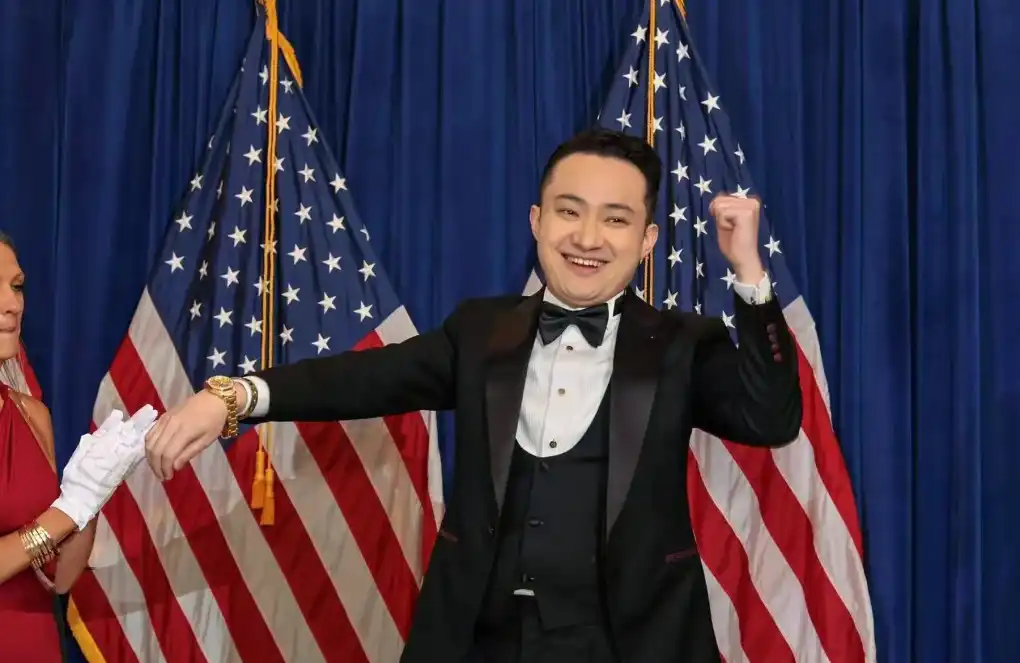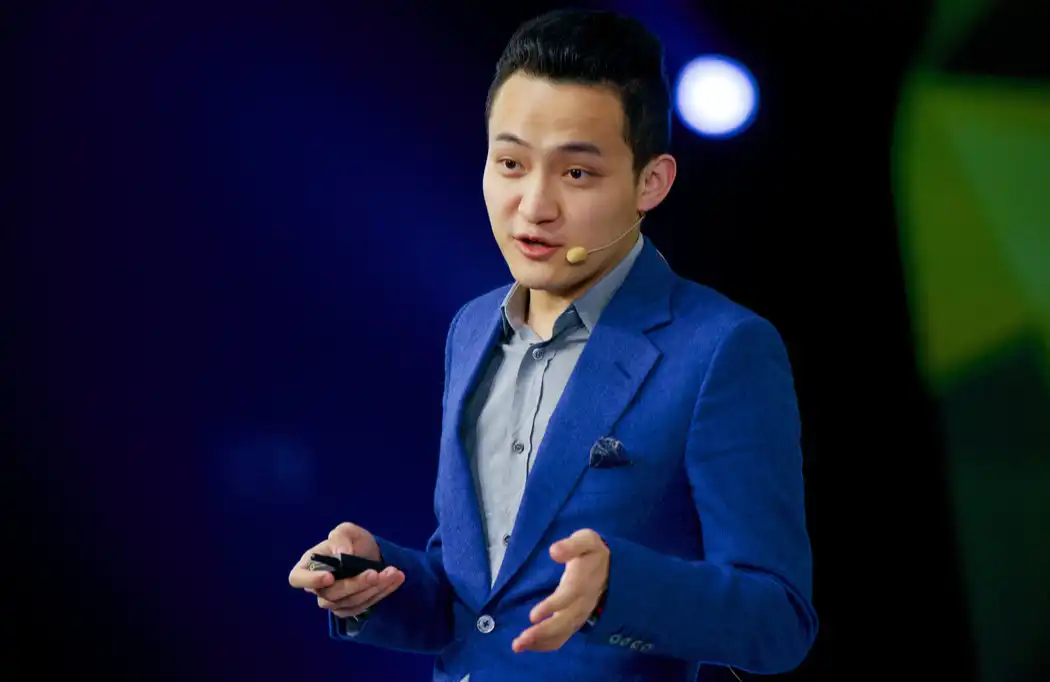What other companies and assets does Justin Sun own in addition to the recently acquired publicly listed company?
Written by: Rhythm BlockBeats
“I measure a person by how much money they've made.” This was a statement Justin Sun made during a speech when he returned to China to start his entrepreneurial journey eight years ago.
What he said, he has also put into practice. Starting in 2014 as the legal representative of the "Peiwo App," the pragmatic and almost cold-blooded Justin Sun has always harbored a dream of building a business empire. He aims to leverage rules to the fullest extent, mobilize resources, and win the game on his terms.
Fast-forward to today, eight years later, and Justin Sun has indeed realized one of the ultimate dreams of nearly every businessman—going public.
His latest deal, valued at $100 million, involves SRM Entertainment, a publicly traded company on the U.S. stock market. Through a reverse merger, Tron successfully entered Nasdaq. At age 35, Justin Sun has become the head of a publicly traded company, and this post-'90s entrepreneur also holds ownership over seven or eight other well-known enterprises and projects in his portfolio.
Justin Sun's Blockchain Empire
Tron: Justin Sun's First Bold Gamble in the Crypto Space
In 2013, Justin Sun joined the Ripple China team as an ambassador, where he earned his first pot of gold and built a valuable network in the blockchain community. With these resources in hand, he quickly began contemplating his own entrepreneurial ambitions, determined to make a significant impact in the blockchain sector.
By 2017, Ethereum had already risen to prominence. Just after celebrating his 27th birthday, Justin Sun put aside his earlier social app ventures, convened a few of his former classmates from Peking University, and, with the backing of major capital figures, began his ambitious journey of launching the Tron (TRON) blockchain with a renewed determination to conquer the crypto world.
Fortunately, he successfully raised approximately $400 million during the TRX token launch and its ICO. Unfortunately, the "9.4" crackdown on ICOs in China soon followed, sending project teams and exchanges fleeing the country in fear. Vowing never to touch blockchain projects again for generations to come, the industry went into survival mode.
During those dark days, Justin Sun refunded the ICO funds, the early core team of Tron nearly disbanded, and partners left, worried about security risks. Justin Sun candidly admitted, “Out of six years of entrepreneurship, the first three were practically a waste.”
The turning point came in April 2019, when Tether decided to issue a TRC-20 version of USDT on the Tron network. From that moment on, Tron shifted its focus almost exclusively to promoting and expanding the adoption of USDT. This strategic pivot became the foundation for 99% of Tron's current market capitalization. Years later, Justin Sun's prediction—“Soon, USDT issued on the Tron blockchain will become the largest stablecoin in the world”—has come true. A substantial portion of USDT’s global on-chain transactions operates on the Tron network.

Data Source: DefiLama
According to the latest on-chain data, USDT transactions on the Tron network now account for over 98% of the network's total transaction volume and gas consumption. In other words, Tron's on-chain activity is almost entirely sustained by USDT "infusions." Typically, users pay transaction fees ranging from $0.3 to $8 per USDT transfer. Based on current statistics, Tron's daily on-chain revenue has exceeded $2.1 million, with an annualized revenue reaching $770 million, the majority of which comes from frequent USDT transaction fees. There are over 2.46 million transactions daily, with an average transaction fee of approximately $0.85, closely aligning with the actual transfer cost of USDT.
As of now, Tron’s total market capitalization has reached $26.96 billion, surpassing that of Mixue Ice Cream & Tea and securing its position as a leading global blockchain, as well as a core infrastructure for stablecoin on-chain circulation.
The "Sentimental Acquisition" of BitTorrent
In the summer of 2018, instead of just focusing on building Tron, Justin Sun undertook a more "mainstream" move—he acquired a once-popular download tool, BitTorrent, for $140 million.
For many millennials and Gen Zs, the name BitTorrent may ring a bell: it was founded in 2001 and became the first globally-scaled P2P file-sharing protocol. At its peak, approximately 40% of the world's internet traffic was transmitted via the BitTorrent protocol. In an era before centralized internet services dominated, BitTorrent stood as a cornerstone embodying the idea of "freedom of download" for that generation.
However, for Justin Sun, this acquisition wasn’t just about nostalgia. Acquiring the BitTorrent client was merely the start. What he truly envisioned was blockchainizing the entire BitTorrent protocol—essentially giving this veteran P2P network a "rebirth."
Not long after the acquisition was finalized, Justin Sun launched the BTT token, adopting the TRC-10 standard, alongside unveiling the "BitTorrent Speed" project. Through this initiative, users can pay in BTT to enjoy faster download speeds when downloading torrents, while seeders are rewarded with BTT tokens for their contribution.
This vision looks promising on paper, but implementation is far from straightforward.
As of now, the total circulating supply of BTT stands at 986 trillion tokens, with a price of approximately $0.00000068. Its total market capitalization is around $670 million, and the 24-hour trading volume consistently hovers around $10 million, with an annualized trading volume surpassing $2.6 billion. Although it remains down roughly 78% from its all-time high (which reached $0.00000304 in January 2022), in today's meme-coin-dominated market, this is considered a fairly average performance.
Poloniex and HTX: Justin Sun's "Cash Flow"
For a long time, Justin Sun's secondary venture in the crypto space has been trading platforms. He owns two exchanges: Poloniex and HTX.
Let's start with Poloniex. Poloniex, an old-school trading platform, was initially acquired by crypto startup Circle for $400 million in February 2018. At the time, Circle aimed to transform it into a compliance pioneer, but this ambition didn’t last long. In October 2019, Poloniex gained independence from Circle with the backing of an Asian investment consortium and Justin Sun, pivoting to deep collaboration with TRON. This partnership spanned multiple areas, including TRC20-USDT stablecoins, DeFi integrations, and the TRON-dedicated section on the platform.
Fast forward to June 9, 2022, Justin Sun made another move. He, along with Poloniex's Reserve Fund and several prominent investment institutions, officially acquired Poloniex and rebranded its Chinese name to "TRON Exchange." This acquisition was seen as addressing the TRON ecosystem's lack of a trading platform and marked TRON's entry into a new phase of "public chain + trading platform" dual driving force. As of now, Poloniex's daily trading volume is approximately $500 million.
Later in October of the same year, Justin Sun turned his attention to another veteran exchange—Huobi.
First, he joined Huobi Global Advisory Board as a global advisor, vowing to push for Huobi's internationalization and HTX ecosystem upgrades. Shortly thereafter, Huobi's executive team underwent significant restructuring. Eventually, Justin Sun, through the Hong Kong-based asset management company About Capital, acquired Huobi’s equity for $1 billion, becoming its advisor. As of now, Huobi remains one of the top 10 trading platforms globally, with a daily trading volume of $2.4 billion.

Source: Coingecko
Poloniex was first acquired by cryptocurrency startup Circle in February 2018 for $400 million. In October 2019, supported by an Asian investment group and Justin Sun, the platform separated from Circle and collaborated with Tron in areas such as the TRC20-USDT stablecoin, decentralized finance (DeFi), and the TRON trading zone. These initiatives propelled Poloniex from being a North American-focused platform to becoming a global entity.
On June 9, 2022, TRON founder Justin Sun announced the acquisition of the prominent exchange Poloniex in partnership with Poloniex Consortium and several renowned investment institutions. At the same time, Poloniex adopted the TRON trading platform as its official Chinese-language community brand. With this acquisition, Poloniex addressed the lack of exchange platforms within the TRON blockchain ecosystem, formally launching TRON's "Blockchain + Exchange" dual-engine strategy.
In October 2022, Justin Sun joined the Huobi Global Advisory Committee and announced plans to expand the strategic roadmap of Huobi Global, with a focus on enhancing its international brand outreach. As of now, Huobi ranks among the top 10 global exchanges, with a daily trading volume of $2.4 billion.
USDD, TUSD, and WBTC
In addition to blockchain and trading platforms, USD stablecoins and wrapped Bitcoin are indispensable components of Justin Sun's cryptocurrency business strategy.
USDD, TUSD, and WBTC—these three tokens closely tied to Justin Sun—form the backbone of his stablecoin and cross-chain asset portfolio.
Let's start with USDD. USDD, a decentralized stablecoin personally spearheaded by Justin Sun, is issued and managed by the Tron DAO Reserve. Based on the latest data, the market cap of USDD on the blockchain is about $432 million, ranking approximately 10th among stablecoins by market cap.

Source: CoinMarketCap
Next, TUSD. While TUSD appears to be independent of Justin Sun's personal assets, various on-chain evidence and fund flow analyses strongly suggest his shadow ownership. Since 2023, TUSD has been a key liquidity asset for both TRON and HTX (formerly Huobi). However, this chess piece has not been without its risks. Due to controversies surrounding its custody and audits, TUSD has lost its peg multiple times and even came under legal scrutiny by the SEC. In 2024, Binance delisted its major trading pairs, and by 2025, the implementation of MiCA regulations led to a complete delisting in the EU, leaving only withdrawal options. To stabilize the situation, Justin Sun personally stepped in during early 2025, injecting over $400 million to maintain TUSD's peg, effectively tying the stablecoin even closer to his own interests. Currently, TUSD's market cap stands at $492.6 million.

Data source: Coinmarketcap
Finally, there's WBTC (Wrapped Bitcoin), an ERC-20 token issued on the Ethereum network. It was first proposed in 2017, officially released with a white paper in 2019, and put into operation. Its value is pegged 1:1 with Bitcoin; every WBTC is backed by an equivalent amount of Bitcoin, managed by a custodian institution (currently BitGo), ensuring that WBTC holders can redeem it for Bitcoin at any time.
Although WBTC is not a project directly operated by him, in the eyes of some foreign media, this heavy-weighted player in TRON’s stablecoin framework has already been viewed as a Bitcoin wrapper indirectly controlled by Justin Sun. Related reading: "Why Did Justin Sun’s Entry into WBTC Stir Such Strong Market Reactions?"
According to the latest data from CoinMarketCap, WBTC boasts a market cap of 13.784 billion USD, making it one of the largest Bitcoin-pegged assets globally.

Data source: Coinmarketcap
DLive: Does Justin Have a Live Streaming Platform?
Compared to the previous projects, DLive might be less well-known.
Initially, DLive was a decentralized live-streaming platform built on the Lino blockchain. Acquired by BitTorrent at the end of 2019, the entire team and tech stack subsequently transitioned into the TRON ecosystem.
Behind this integration lies another strategic move by Justin Sun in the “content platform + blockchain” trajectory. DLive adopted BTFS (BitTorrent File System) for decentralized storage, while the BTT token is used for tipping streamers and incentivizing content distribution. This forms a fully blockchain-based closed-loop system encompassing content creation, storage, and reward-sharing. Additionally, DLive shares a user account system with BitTorrent, uTorrent, and Steemit, positioning BTT as the "universal token" within this content ecosystem.
This is precisely why DLive once attracted overseas top-tier streamers like PewDiePie to join the platform. With monthly active users continually growing, it became one of the most traffic-heavy content frontends within the TRON ecosystem. However, its lenient community management also planted potential risks.

Overseas top-tier streamer PewDiePie streaming on DLive back then
In early 2021, DLive faced intense criticism from both public opinion and regulatory authorities after users live-streamed the U.S. Capitol riot on the platform, raising doubts over its content moderation and risk control mechanisms.
Art Arsenal: APENFT Marketplace
When it comes to Justin Sun's identity, beyond being a businessman, he’s perhaps most famously known as an ardent art collector. His collection boasts a long list of top-tier masterpieces, including works by Picasso, Andy Warhol, Giacometti, and Basquiat. He even made headlines recently by purchasing a $6.2 million "banana" artwork, propelling himself into the media spotlight.

As a top-notch art collector, it’s no surprise that Justin Sun also operates an NFT marketplace.
On March 29, 2021, Justin Sun officially registered the APENFT Foundation in Singapore, aiming to bridge the gap between traditional art and the NFT world. The core mission of APENFT is straightforward: on one hand, it acquires top-tier traditional artworks and NFT creations as foundational assets, and on the other, incubates young NFT artists to pave the way for them. At the same time, it sponsors galleries, organizes exhibitions, sets up awards, and supports art critique and research, providing a blockchain-powered new pathway for the global art community.
To ensure better security for on-chain art, APENFT adopted Ethereum and TRON as its dual underlying technologies—leveraging Ethereum for its smart contract capabilities and global recognition while utilizing TRON for its high throughput and low gas fee requirements. Another of Justin Sun’s early ventures, BTFS (BitTorrent File System), has also been integrated into the platform to provide decentralized storage, ensuring that art files are always accessible, immutable, and safeguarded against single-point failures.
Since 2021, the APENFT Marketplace has officially launched, serving as an NFT trading platform based on TRON, specializing in digitizing top-tier artwork, fractionalizing them into NFTs, and enabling global users to own "fragmented ownership rights" of collectibles. In 2022, Justin Sun spent tens of millions of dollars acquiring pieces such as the "Digital Zodiac Heads," "The Nose," and "Reclining Nude with Necklace," which were directly donated to the APENFT Foundation to further bolster its leverage in the digital art space.
Leveraging the traffic from the TRON community, Justin Sun's personal media buzz, and TRON's network fees as low as under $1, APENFT Marketplace quickly attracted a flood of creators and players. Justin Sun even announced that 100% of transaction fees from the platform would go towards buybacks and token burning of the platform's native token, coupled with various hackathons, racing contests, and other activities, turning the NFT space into a lively playground of innovation.
Currently, the market capitalization of the $NFT token on the APENFT Marketplace stands at $420 million.
From TRON to BitTorrent, from Poloniex to HTX, and from stablecoin liquidity "cash pools" like USDD, TUSD, and WBTC to the "on-chain art museum" that is APENFT Marketplace.
In less than a decade, Justin Sun has meticulously shaped his crypto empire into a fully integrated ecosystem spanning public blockchains, trading platforms, stablecoins, NFTs, cross-chain solutions, and even global politics.
Behind this seemingly fragmented yet tightly interconnected network, based on data from BlockBeats, Justin Sun's core assets exceed a valuation of $43 billion.
Most recently, with a $100 million acquisition of SRM Entertainment, Justin Sun has propelled TRON into the Nasdaq playing field via reverse merger, backed, it seems, by the rising warmth of his growing network with the Trump family.
Justin Sun and His Love-Hate Relationship with America
Justin Sun’s relationship with America dates back to his graduate study days at the University of Pennsylvania.

In 2011, he was a master’s student in East Asian Studies but filled his electives with courses at the Wharton School of Business, including investment, entrepreneurship management, and venture capital. Meanwhile, he co-founded the show "Three People Living Abroad", turning international student life into a video series that went viral across platforms like Youku, Bilibili, and YouTube, even attracting coverage from CCTV.

It was during that time that Justin Sun was introduced to the concept of Bitcoin through Reddit and local technology communities. Compared to today’s $100,000 price tag, Bitcoin was practically “dirt cheap” back then, sitting at around $10. Justin started by dipping his toes in with small investments and eventually went all in.
By the end of 2013, Justin Sun decided to forego the opportunity to pursue further studies in law school and joined Ripple Labs, becoming one of the first evangelists for the Ripple protocol in China. In 2014, he returned to China, secured funding from IDG Capital, and founded Raybo Technology. Despite facing challenges such as the ICO ban, the disbanding of his entrepreneurial team, fleeing abroad, and being mocked as the "Jia Yueting of the crypto world," he managed to persevere.
However, to the Biden administration, Justin Sun has always been considered a “troublesome agitator on the blockchain.”
In 2023, the U.S. SEC officially filed a lawsuit against him, accusing him of price manipulation involving TRX and BTT, as well as the illegal sale of unregistered securities. Even the celebrities who endorsed him—including Akon, Ne-Yo, Soulja Boy, Lindsay Lohan, and Jake Paul—were fined as part of the case. As a result, Justin Sun has been unable to enter the U.S. for years.
Justin Sun clearly understands that in a nation like the United States, where power constantly shifts, no setback is permanent, and no chapter is impossible to turn. For him, the 2024 election might be the best chance for a turnaround.
While traditional Wall Street financial giants were tentatively exploring cryptocurrency and U.S. politicians were still bickering over crypto regulations, Justin Sun had already quietly made his move. "I always believed that President Trump would bring many positive impacts to the crypto industry. After he was elected, the entire crypto world transformed," he once told the media.
The Trump family has openly backed the cryptocurrency industry, personally participating in the World Liberty Financial project. Meanwhile, Justin Sun invested a total of $75 million between the end of last year and early this year, making him the project’s largest backer. As a result, the Trump family appointed him as a core advisor to the project.
HTX, under Justin Sun’s control, became the first platform to list WLFI’s new stablecoin, USD1. With advisory, capital, and market access already secured, Justin Sun didn’t stop there—he went all in on Trump Token ($Trump), becoming the largest token holder with 1.43 million tokens valued at around $23 million.
Shortly thereafter, the Trump team announced an exclusive dinner for the top 220 $Trump token holders. Justin Sun wasted no time tweeting about being the biggest holder. Reportedly, Trump himself only attended the dinner for half an hour, while the latter part of the event turned into what many netizens jokingly referred to as the "Justin Sun Dinner," as it seemed to spotlight him entirely.

Justin Sun was awarded a gold watch as the largest holder of TrumpCoin during a Trump dinner.
"I am the bridge of communication between the crypto industry and the President; to some extent, I might also be a bridge for future U.S.-China communication," he said in an interview. "My original intention was to build a good relationship with the Trump family and introduce more people from the traditional world into the blockchain space. We will engage in a long-term, continuous partnership with President Trump's crypto project to drive the progress and development of our entire industry."

Left: Justin Sun; Right: Donald Trump Jr.
For an entrepreneur, aside from the numbers in their accounts, what they care about most is freedom. Compared to CZ, who paid a staggering $4.4 billion fine just to ensure freedom of travel to and from the U.S., Justin Sun has paid a much smaller price.
Therefore, regarding his return to the U.S., Justin Sun appeared quite delighted. Not only did he visit multiple locations and companies, but he also posted numerous tweets to showcase his "affection" for Trump.


From being a "quasi-suspect" pursued by the FBI and SEC to now flaunting a gold watch gifted by the President at the White House, Justin Sun has navigated this crypto-political gala in his signature style, and the story seems to have reached its climax.
But a money-loving "Brother Sun" most likely has no plans to stop here.
Welcome to join the official BlockBeats community:
Telegram Subscription Group: https://t.me/theblockbeats
Telegram Discussion Group: https://t.me/BlockBeats_App
Official Twitter Account: https://twitter.com/BlockBeatsAsia
 Forum
Forum OPRR
OPRR Finance
Finance
 Specials
Specials
 On-chain Eco
On-chain Eco
 Entry
Entry
 Podcasts
Podcasts
 Activities
Activities









